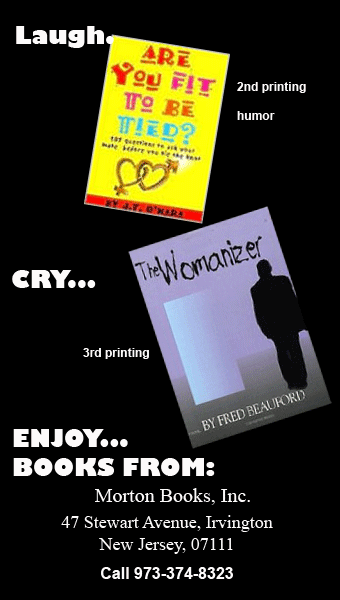LETTERS
Write Me A Letter...
Dear Fred:
You are doing a marvelous job with Neworld Review. I enjoyed reading Daji's review of Earnest Adams's book (From Ghetto to Ghetto: An African American Journey to Judaism). I have decided to buy it. The pictures he posted on Facebook brought back many memories. I recently listened to our debate concerning African American Studies. I am going to make you a copy with a photo, I wish you continued success with your publishing company and writings. I also enjoyed your novels.
Winston Duckett
Yonkers, N.Y.
Dear Fred:
I was very pleased to receive this email and the links to the Neworld Review, and your personal blog. I’m so glad that you’ve nabbed Daji to write for Neworld. I am eagerly looking forward to reading both (and would love to contribute something to a future issue of the review).
I had to write to commend you on the unusually attractive and readable graphic design of this on-line journal. My 60-year-old eyes were very happy—and so were my graphic design sensibilities!
Diana Baird N'Diaye, Ph.D.
Cultural Heritage Specialist/Curator
Smithsonian Institution
600 Maryland Avenue SW, Suite 2001
Washington, DC 20024-2520
Dear Fred:
The topic for one in ten Americans today is that of jobs. It hits home for writers too. What happened to the jobs? It is simple. For the entire twentieth century, the corporate world automated, computerized, and robotized production and business – the basis of work and income; and they vastly improved food production. They did all this purposefully: to define and control larger markets and increase profits. They accomplished this too.
Not only have they created fourteen million unemployed, they have narrowed and dumbed down the reading population. Herman Melville would go hungry today in America. Likely, so would Agee, Hemingway, Fitzgerald, Faulkner, Baldwin, Ellis, Cheever, Porter, Wolfe (the original, not the sartorially splendid one] Wright, and too many others to mention.
Corporate leaders, politicians, and the American people have overlooked the automated disappearance of jobs and the emasculation of our once promising literary culture. And being lost in a completely arcane economic concept of ravenous competition, regardless of the effect upon the common man, they are unable to reach equitable economic conclusions.
The country’s remaining serious readers have become compartmentalized into tiny market niches, while the great unwashed majority just read blockbuster trash, if anything at all.
You have only to step into any giant corporate bookstore to see what most of the best sellers are. They contain embarrassingly shallow mental junk.
Regarding jobs, income, and our economy (I’m trying to remain focused here) we don’t need larger individual consumption to rebalance America’s economy and provide income for all of us. We’ve been consuming 60% plus of the entire world’s output since the end of World War II. Our self-storage boxes, our attics, and our basements are bulging with wasted consumption.
We need a conscious sharing and redistribution of the diminished available work, and some common sense frugality. How about some financial stimulus money to design some new literary publications directly targeted to demographic groups not usually on the readers radar scale? All of this would help redistribute income. It would help keep us from self destructing our economy and culture.
We writers need to recognize that a cultural renaissance is needed if we are to curtail America’s trend toward intellectual inferiority.
This is the writers’ challenge for the twenty-first century. We American writers have been so busy writing about our navels, our sexuality, our racial problems, psychological inadequacies, our erratic lives, our enthralling loves and volcanic hates, our beliefs and prejudices, our self serving lifestyles, and our personally all-consuming conceit that we are each divinely endowed with hyper-acute sensitivity to the nuanced emotions of the human race-- that we have been slighting the 20th century’s really important subject: the intellectual and economic theft of the nation by a handful of unethical and obviously not too damned bright corporate, political, and media leaders.
We obsess so much, groping for artistic panache and stylistic purity in order to find an audience, that of late we have been missing the bulls eye: the need to reconnect with the guy in the street.
It’s as if we too have become enamored of the overly shallow Pop American culture that infests the minds of this country’s people, whose mental potential is so much greater than they allow it to be. Writers have to be perceptive. You can’t write anything that helps people if you think you’ve got a keener eye and ear than the average guy walking down the street, trailing a six pack or a boom box.
I believe a writer’s job is always to think and to try to affect people positively. To help them grow. If not, it’s just to feed our own egos, and as Abe Lincoln used to say: “That plow won’t scour.”
To matter at our craft in today’s oligarchic economy, requires that we redefine our role in American life. You, cantankerously assertive Fred Beauford, has been an innovator in this. I applaud you, Fred. May you strive to remain humble and live a long life.
And, maybe we can all work together to figure out how we might help impact the culture and economy of America. It desperately needs some serious thinking and innovating on the part of some serious thinkers. That’s what we as writers are supposed to be.
A renaissance won’t occur if writers try to fit the corporate mold in order to make a living. It will arrive by our digging deep and taking risks. Shall we flood the writers’ marketplace with some daring stuff? Maybe we can teach the current crop of unlettered literary agents and the corporate publishing footmen what their trade is really all about. That they, and we, are responsible for a nation’s culture. If we find we cannot master this task, then they, and we, will discover we have instead found an illusorily safe home in the great, gaping maw of Capitalism . . . as literary harlots.


